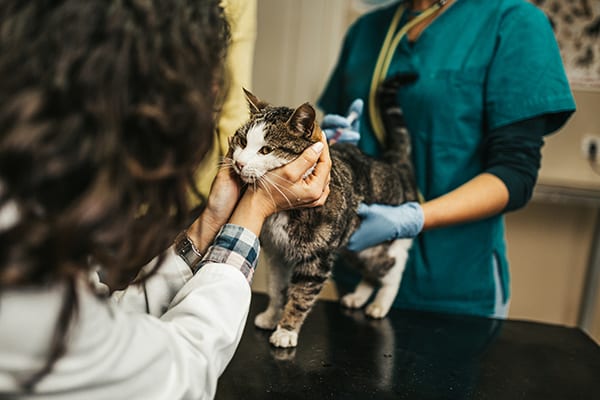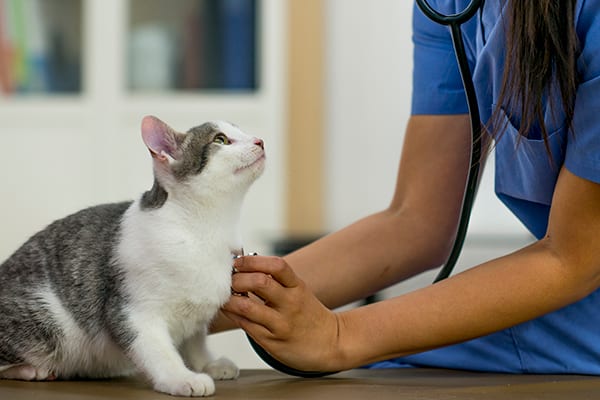My Cat Never Goes Outside in Oak Park: Why Heartworm Preventatives?

Do you have a cat? Does he/she stay indoors more often than not? Is he/she an entirely indoor cat who never goes outside? If this sounds like you and your feline’s situation, then you may often find yourself wondering whether or not it’s really important to give your cat a heartworm preventative. After all, if heartworms are spread by mosquitoes, won’t your cat be safe from them by living indoors?
In this article, you’ll find answers to all your questions about indoor cats and heartworm prevention. Read through the information below to help educate yourself and ensure that you’re always making the right decisions for your cat.
Where do heartworms come from?
Heartworms are carried from an infected animal to a healthy one by mosquitoes. When a mosquito bites an animal that has heartworms and then bites a healthy one, the worms are transferred into the healthy animal’s bloodstream.
If the healthy animal is not on a heartworm preventative, then the worms will eventually reach that animal’s heart and will begin reproducing there. If left untreated, this infestation will get out of control quickly, and the animal’s heart, lungs, and bloodstream may quickly become overloaded with worms.
Aren’t heartworms a dog problem?
Yes and no. Heartworms are considerably more common in dogs than they are in cats, and any dog is potentially susceptible to them. Dogs are also much more likely to have dozens or even hundreds of heartworms in their body at any given time, after they have been infected for a while. Cats, on the other hand, may only have a few.
With that said, however, cats can still become infected with heartworms, and this problem is still potentially deadly. Although it’s a lot less likely for a cat to be infected, heartworms are more likely to prove fatal to a cat quickly—and sometimes before they are even noticed by the vet or the owner.
Cats are not prime heartworm hosts. They are generally carriers in between mosquitoes and dogs.
What are the symptoms of heartworms in cats?
For a while after heartworms have entered a cat’s body, he may show no signs or symptoms at all. Eventually, however, he may develop a severe cough or could show signs of asthma.

Cats with heartworms may have seizures, may vomit frequently, or might have no appetite. Some cats with heartworms might lose a lot of weight fast, even if they are eating normally and otherwise haven’t had any other changes.
For many cats, no symptoms will present themselves at all until the cat dies of the heartworm infection. This is why it is so important to keep a cat on up-to-date heartworm prevention.
How can a preventative help my cat?
Giving a cat—or any animal—a heartworm preventative will kill any larvae that may be present in the animal’s body. This type of preventative medication works somewhat retroactively, in that it will kill larvae that have been in the body for up to two months.
It is important to have your cat tested for heartworms before starting a preventative. Giving a preventative while adult heartworms are present in the cat’s body already may send the body into shock and can cause sudden death.
Cats can be given heartworm medication as early as 8 weeks old.
What happens if my cat has heartworms already?
Understand that heartworms cannot be treated in cats. Although they can be managed in dogs, even with a diagnosis, there is no treatment option for cats. Their health can simply be maintained for as long as possible through other means.
Your cat will need to have chest x-rays once or twice a year to check for the presence of worms in the lungs. If there are worms present, your vet will give your cat a shot to help make it easier for them to breathe.
In situations where your cat’s health takes a sharp turn for the worse, they may need to be kept at the vet’s for a while and may require IV fluids and medication. While at the vet, they will be monitored and their symptoms will be treated as well as possible.
Very rarely, heartworms may be able to be removed from a cat’s body via surgery. This is not always a possibility, but your vet will let you know if it is for your cat.
What happens if I miss a dose of my cat’s heartworm prevention medication?
If you miss one month, you can simply start again the next month. Do not double up on doses, or you may risk overloading your cat’s body.
If you miss two months, you will need to take your cat back to the vet for heartworm testing before you can safely give them preventatives once again.
Doesn’t living indoors keep cats safe from heartworm exposure?
Living indoors will reduce your cat’s risk of heartworm, but it does not eliminate it entirely.

Think of it this way: have you ever been sitting inside and suddenly realized a mosquito is buzzing around your face? Insects come inside all the time; opening a door or window can easily allow them to breeze in. When this happens, your cat is at risk for those insects carrying diseases or parasites. By keeping your cat on a heartworm preventative, you do not have to worry about this potential problem for your furry friend.
Keep Your Cat Protected in Oak Park with Heartworm Preventatives
As you can see, it’s important to keep up with regular heartworm prevention and testing, even in your indoor cat. If you are still thinking about adopting a cat, make sure you consider this in the cost of keeping your new pet, and consider whether or not you will be able to cover this expense before you adopt.
And if you already have a cat, don’t worry—it’s not too late! You can schedule a vet appointment and get your cat tested for heartworms right away. As long as he receives the all-clear from the vet, you can get him started on heartworm preventatives and help him stay healthier longer.
